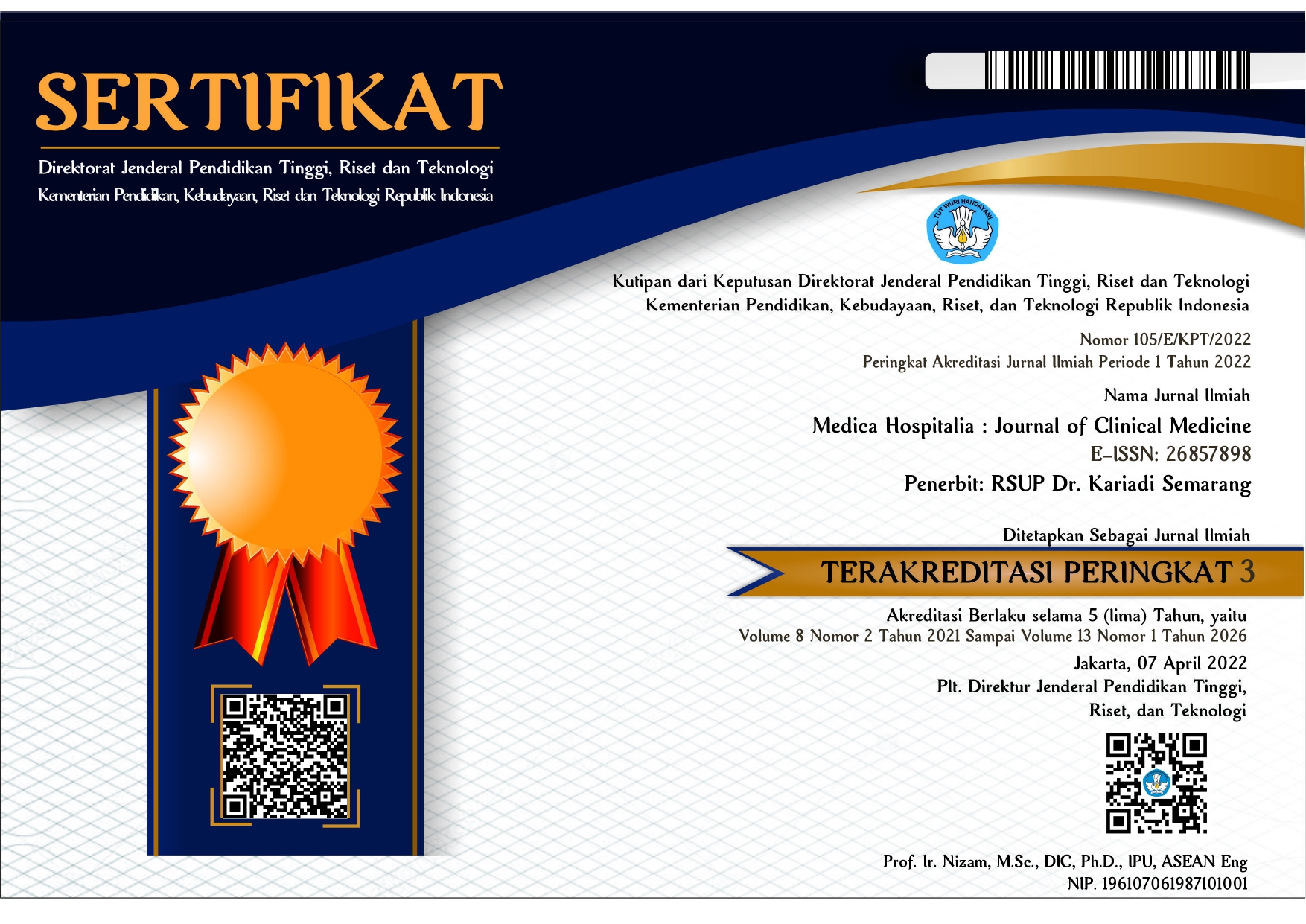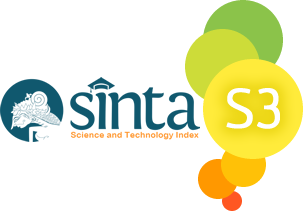Hubungan Antara Mekanisme Koping Dengan Derajat Depresi Pada Caregiver Pasien Skizofrenia Studi di unit rawat jalan Rumah Sakit Jiwa Amino Gondo Hutomo Provinsi Jawa Tengah
DOI:
https://doi.org/10.36408/mhjcm.v7i2.520Keywords:
Mekanisme koping, Depresi, CaregiverAbstract
Latar Belakang: Memiliki anggota keluarga yang menderita skizofrenia merupakan suatu stressor yang mengakibatkan stres yang bersifat kronik. Stress kronik lebih banyak dihubungkan dengan tingkat derajat depresi. Derajat depresi dibedakan sesuai dengan banyak dan beratnya gejala terhadap fungsi kehidupan pasien. Caregiver pasien skizofrenia akan melakukan mekanisme koping dalam mengatasi stressor tersebut yang terbagi atas problem focused coping dan emotion focused coping. Mekanisme koping memiliki peranan penting dalam interaksi antara situasi yang menekan dan proses adaptasi.
Tujuan: Mengetahui hubungan mekanisme koping dan derajat depresi pada caregiver pasien skizofrenia.
Metode: Penelitian ini merupakan penelitian analitik kuantitatif dengan rancangan cross sectional. Sampel adalah caregiver pasien skizofrenia di unit rawat jalan Rumah Sakit Amino Gondohutomo Jawa Tengah dan memenuhi kriteria inklusi penelitian. Subyek penelitian sebanyak 58 responden di pilih dengan metode consecutive sampling. Instrumen penelitian yang digunakan adalah Beck Depression Inventory (BDI) II dan Kuesioner The Ways of Coping serta kuesioner karakteristik sosiodemografi. Analisis dengan program komputer SPSS.
Hasil : 27 responden (46,6%) menggunakan emotional focused coping. 31 responden (53,4%) menggunakan problem focused coping. 43 responden (74,1%) tidak depresi, 12 responden (20,7%) depresi ringan, 2 responden (3,4%) depresi sedang dan 1 responden (1,7%) depresi berat. Hasil analisis hubungan mekanisme koping dengan derajat depresi caregiver pasien skizofrenia dengan menggunakan uji Chi-square didapatkan P value > 0,05 bahwa tidak ada hubungan yang signifikan antara mekanisme koping dengan derajat depresi caregiver pada pasien skizofrenia.
Simpulan: Tidak terdapat hubungan antara mekanisme koping dengan derajat depresi pada caregiver pasien skizofrenia
Kata kunci :Mekanisme koping, Depresi, Caregiver
Background: Having family members who suffer from schizophrenia is a stressor that results in chronic stress. Long life events or chronic stress are more associated with depression. Derajat depresi dibedakan sesuai dengan banyak dan beratnya gejala terhadap fungsi kehidupan Caregiver schizophrenic patients will carry out coping mechanisms in dealing with these stressors which are divided into problem focused coping and emotion focused coping. Coping mechanisms have an important role in the interaction between situations that suppress and adaptation processes.
Objective: To analyze the relationship between coping mechanisms and the degree of depression in caregiver schizophrenic.
Method: This study is a quantitative analytic study with a cross sectional design. The sample was a schizophrenic caregiver in the outpatient unit of Amino GondoHutomo Hospital in Central Java and fulfilled the study inclusion criteria. Sampling using consecutive sampling method. The research instruments used were the Beck Depression Inventory (BDI) II and The Ways of Coping Questionnaire and the socio-demographic characteristic questionnaire. Analysis with computer programs.
Results: 27 respondents (46.6%) used emotional focused coping. 31 respondents (53.4%) used problem focused coping. 43 respondents (74.1%) were not depressed, 12 respondents (20.7%) mild depression, 2 respondents (3.4%) moderate depression and 1 respondent (1.7%) had severe depression. The results of the analysis of the relationship between coping mechanism with the degree of caregiver depression in schizophrenic patients using the Chi-square test obtained P value> 0.05 that there was no significant relationship between coping mechanisms with caregiver depression degrees in schizophrenic patients.
Conclusion: There is no relationship between coping mechanism and the degree of depression in the caregiver of schizophrenic patients
Keywords: Coping mechanism, Depression, Caregiver
Downloads
References
2. Dinkes Semarang. Orang Dalam Gangguan jiwa: di semarang. Https://www.ProfilDinkes-kota-Semarang. 2018.
3. Guerriere DN, Zagorski B, Coyte PC. Care for the Family Caregiver?: A Place to start. In: NAC .U.S. 2010;Vol 27:632-638.
4. Rofail D, Regnault A, le Scouiller S, Lambert J, Zarit SH. Assessing the impact on caregivers of patients with schizophrenia: psychometric validation of the Schizophrenia Caregiver Questionnaire (SCQ). BMC Psychiatry. 2016;16(1):245.
5. Demirbas H, Tugba E, Kizil O. Burnout and Related Factors in Caregivers of outpatients with Schizophrenia. Heighpubs Depress Anxiety. 2017;1:1-11.
6. Barbara KS, Danielle A, Schlosser P. Multifamily Group Treatment for Schizophrenia. NIH Public Access. 2012;59(3):2-5.
7. MacCourt P. Family Caregivers Advisory Committee, Mental Health Commission of Canada. National Guidelines for a Comprehensive Service System to Support Family Caregivers of Adults with Mental Health Problems and Illnesses. 2013.
8. Subandi MA. Interaksi Dinamis Penderita Gangguan Psikotik dengan Keluarga. Bul Psikol. 2014;22:87-93.
9. Sri IM. Kecenderungan Depresi Pada Keluarga Pasien Skizofrenia. 2003.
10. Obembe OB, Adeyemo S, Ogun OC, Ijarogbe GT. The reletionship between coping styles and depression amongcargivers of children withcerebral palsy in Nigeria, West Africa. Arch Clin Psychiatry. 2019;46(6):145-50.
11. Grover S, Pradyumna, Chakrabarti S. Coping among the caregivers of patients with schizophrenia. Ind Psychiatry J. 2015;24(1):5.
12. Kumari P, He G, Wang XH. Extent of Burden and coping among family Caregivers living with schizophrenic patients in Nepal. Int J Sci Basic Appl Res. 2014;14(1):428-443.
13. Chou PC, Chao YMY, Yang HJ, Yeh GL, Lee TS-H. Relationships between stress, coping and depressive symptoms among overseas university preparatory Chinese students: a cross-sectional study. BMC Public Health. 2011;11(1):352.
14. The ICD-10 Classification of Mental and Behavioural Disorders. 1994:32.
15. APA Diagnostic and Statistical Manual of Mental Disorders, Fifth Edition. 2015.
16. Retnowati R, Sriati MW. Strategi Koping Keluarga Dalam Merawat Anggota Keluarga Penderita Skizofrenia Di Instalasi Rawat Jalan Rumah Sakit Jiwa Provinsi Jawa Barat. 2012.
17. Sambang RSJ, Kalimantan L. Gambaran Kecenderungan Depresi Keluarga Pasien Skizofrenia Berdasarkan Karakteristik Demografi Demografi Dan Psikososial. 2016.
18. Marcus M, Yasamy MT, Ommeren M, and Chisholm D. Depression A Global Public Health Concern. WHO Department of Mental Health and Substance Abuse. 2012.
19. Tofoli SM, Baes CW, Martins CMS, Juruena M. Early life stress: HPA axis, and depression. Psychol Neurosci. 2011;4(2):229-234.
20. Benjamin JSM, Virgina ASM. Synopsis Psychiatri: Behavioral Sciences / Clinical Psychiatri. tenth edit.; 2010.
Additional Files
Published
How to Cite
Issue
Section
Citation Check
License
Copyright (c) 2020 Medica Hospitalia : Journal of Clinical Medicine

This work is licensed under a Creative Commons Attribution-ShareAlike 4.0 International License.
Copyrights Notice
Copyrights:
Researchers publishing manuscrips at Medica Hospitalis: Journal of Clinical Medicine agree with regulations as follow:
Copyrights of each article belong to researchers, and it is likewise the patent rights
Researchers admit that Medica Hospitalia: Journal of Clinical Medicine has the right of first publication
Researchers may submit manuscripts separately, manage non exclusive distribution of published manuscripts into other versions (such as: being sent to researchers’ institutional repository, publication in the books, etc), admitting that manuscripts have been firstly published at Medica Hospitalia: Journal of Clinical Medicine
License:
Medica Hospitalia: Journal of Clinical Medicine is disseminated based on provisions of Creative Common Attribution-Share Alike 4.0 Internasional It allows individuals to duplicate and disseminate manuscripts in any formats, to alter, compose and make derivatives of manuscripts for any purpose. You are not allowed to use manuscripts for commercial purposes. You should properly acknowledge, reference links, and state that alterations have been made. You can do so in proper ways, but it does not hint that the licensors support you or your usage.

























